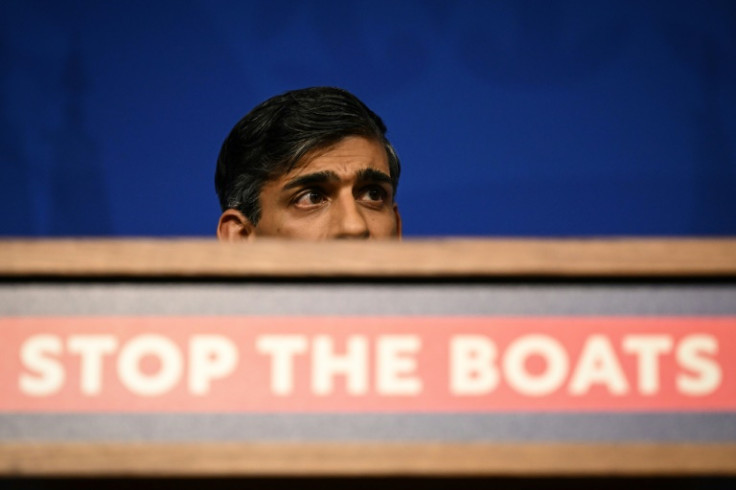Fresh Setback For Sunak As ECHR Says Rwanda Plan Breaches International Law
Rwanda has said that it would not be able to continue with the UK deal if Mr Sunak's government did not abide by international law.

Rishi Sunak has been handed a fresh setback for his Rwanda plan after the ECHR declared that it breaches International Law.
The president of the European Court of Human Rights (ECHR), Síofra O'Leary, said today that "there is a clear legal obligation" for states to comply with orders from the Strasbourg court.
Demands called 'rule 39 interim measures' can be issued by the ECHR in certain circumstances, and one such order contributed to the 2022 grounding of the first flight intended to take asylum seekers to Rwanda.
Ms O'Leary told a press conference: "There is a clear legal obligation under the convention for states to comply with rule 39 measures."
She said the interim measures are only issued "in exceptional circumstances where there is a real and imminent risk of irreparable harm".
Despite these concerns, the prime minister has repeatedly vowed not to let what he called a "foreign court" block the government's plan to deport migrants to the East African nation.
At the start of his premiership, Sunak had promised as one of his five pledges to "stop the boats" but his Rwanda Bill, which aimed to deal with illegal migration, was recently declared unlawful by The Supreme Court.
Since then, the government has proposed a new version of the bill, which survived a knife-edge Commons vote last week - Lee Anderson and Brendan Clarke-Smith were amongst 58 other right-wing MPs, including former Prime Minister Boris Johnson, who supported the rebel amendments to the flagship of the Rwanda policy.
Sunak was then dealt a further blow as Britain's unelected upper house of parliament voted to delay ratification of the treaty with Kigali.
The move was a major blow to the PM, who had urged the House of Lords to pass the plan, saying it was the will of the people.
A majority of peers – 214 against 171 – voted to delay ratification of the treaty that London signed with Kigali until the British government had demonstrated that Rwanda was a safe country for migrants who would be deported there.
And now Sunak has been warned that he will be breaking human rights law if his government ignores European court orders intended to stop asylum seekers being sent to Rwanda.
Senior judge Ms O'Leary said the UK "has always complied with rule 39 measures", except in one very particular case, and has "publicly declared the need for other states to comply with rule 39 indications".
She is referring to The UK previously urging Vladimir Putin's Russia to abide by a 2021 measure concerning the release of opposition leader Alexei Navalny.
However, No 10 rejected the criticism and insisted the government's Rwanda legislation would not need any emergency interventions from the Strasbourg court.
Mr Sunak's official spokesman said: "We are confident our legislation is compliant with our international obligations...There should be no need for Strasburg to intervene to block flights in the way they did in 2022."
But the top No 10 official added: "We've also drafted the bill to give ministers the power not to comply with those rulings if necessary ... The prime minister has been clear repeatedly that we will not let a foreign court block flights from taking off."
The spokesman said the combination of the Rwanda legislation and the new treaty with the African country would see off any need for a Rule 39 measure from the ECHR.
Rwanda though, has said that it would not be able to continue with the UK deal if Mr Sunak's government did not abide by international law.
Rwanda's minister of foreign affairs Vincent Biruta has said previously: "It has always been important to both Rwanda and the UK that our rule of law partnership meets the highest standards of international law, and it places obligations on both the UK and Rwanda to act lawfully. "
"Without lawful behaviour by the UK, Rwanda would not be able to continue with the Migration and Economic Development Partnership."
Sunak is already dealing with internal threats to his premiership, after Simon Clarke, a former Cabinet minister, launched an attack on the PM earlier this week.
Writing in The Daily Telegraph on Tuesday, Clarke claimed Sunak was "leading the Conservatives into an election where we will be massacred".
He added: "He does not get what Britain needs. And he is not listening to what the British people want."
But several senior Conservative MPs swiftly criticised his remarks, including the former home secretary Priti Patel, who said: "Engaging in facile and divisive self-indulgence only serves our opponents."
© Copyright IBTimes 2024. All rights reserved.






